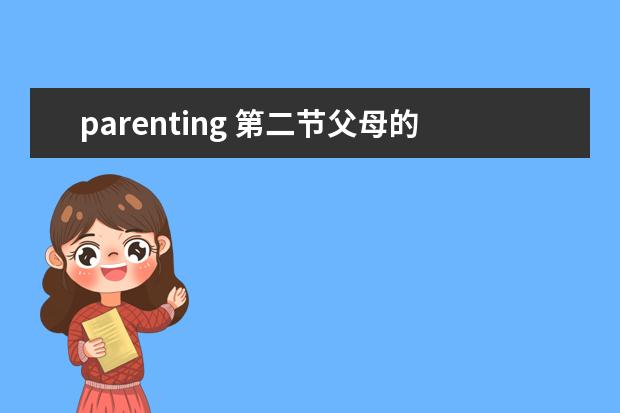当前城市:淄博[切换]
- 手机雅思无忧

扫码登录
雅思考试主要是通过对考生听、说、读、写四个方面英语能力的考核,综合测评考生的英语沟通运用能力,实现“沟通为本”的考试理念。对于雅思考生来说,也有很多考试难点和政策盲区需要帮助解答。今天雅思无忧网小编准备了parenting 第二节父母的教养方式ParentingStyles,希望通过文章来解决雅思考生这方面的疑难问题,敬请关注。
Helicopter parenting, the practice of hovering anxiously near one’s children, monitoring their every activity, is so 20th century. Some affluent mothers and fathers now are more like snowplows: machines chugging ahead, clearing any obstacles in their child’s path to success, so they don’t have to encounter failure, frustration or lost opportunities.
Taken to its criminal extreme, that means bribing SAT proctors and paying off college coaches to get children into elite colleges—and then going to great lengths to make sure they never face the humiliation of knowing how they got there.
It starts early, when parents get on wait lists for elite preschools before their babies are born and try to make sure their toddlers never do anything that may frustrate them. It gets more intense when school starts: running a forgotten assignment to school or calling a coach to request that their child make the team.
Yes, it’s a parent’s job to support the children, and to use their * wisdom to prepare for the future when their children aren’t mature enough to do so. That’s why parents hide certain toys from toddlers to avoid temper tantrums or take away a teenager’s car keys until he finishes his college applications.
But snowplow parents can take it too far, some experts say. If children have never faced an obstacle, what happens when they get into the real world?
Learning to solve problems, take risks and overcome frustration are crucial life skills, many child development experts say, and if parents don’t let their children encounter failure, the children don’t acquire them.
Helicopter parenting, the practice of hovering anxiously near one’s children, monitoring their every activity, is so 20th century. Some affluent mothers and fathers now are more like snowplows: machines chugging ahead, clearing any obstacles in their child’s path to success, so they don’t have to encounter failure, frustration or lost opportunities.
Taken to its criminal extreme, that means bribing SAT proctors and paying off college coaches to get children into elite colleges—and then going to great lengths to make sure they never face the humiliation of knowing how they got there.
It starts early, when parents get on wait lists for elite preschools before their babies are born and try to make sure their toddlers never do anything that may frustrate them. It gets more intense when school starts: running a forgotten assignment to school or calling a coach to request that their child make the team.
Yes, it’s a parent’s job to support the children, and to use their * wisdom to prepare for the future when their children aren’t mature enough to do so. That’s why parents hide certain toys from toddlers to avoid temper tantrums or take away a teenager’s car keys until he finishes his college applications.
But snowplow parents can take it too far, some experts say. If children have never faced an obstacle, what happens when they get into the real world?
Learning to solve problems, take risks and overcome frustration are crucial life skills, many child development experts say, and if parents don’t let their children encounter failure, the children don’t acquire them.
unstoppable
adj. 无法被停止的;无法阻挡的
词根词缀:un-(否定) ;-able(可以做到的)
相关词汇:stop(v. 停止)
obstacle
n. 阻碍、路障
proctor
n. 监考官
assignment
n. 作业(可数)
mature
adj. 成熟的
反义词:immature
take sth. too far
把某事做得过头了
英文释义:to do or perform something in a way that is not acceptable
长难句解析
Taken to its criminal extreme, that means bribing SAT proctors and paying off college coaches to get children into elite colleges—and then going to great lengths to make sure they never face the humiliation of knowing how they got there.
句子开头 taken to its criminal extreme,是过去分词做条件状语,补回句中省略的部分,这个句子实际上是 If something is taken to its criminal extreme,其中的 something 就是扫雪式育儿,也是整个句子的主语,谓语部分 take something to extremes,表示把某件事情做过头了,意思就是,如果扫雪机式育儿这种做法被带到了犯罪的地步的话,它会是怎么样的呢?that means bribing SAT proctors and paying off college coaches to get children into elite colleges,that 指的还是主语扫雪式育儿,句子提到了两件事情,bribing SAT proctors,贿赂 SAT 的考官,以及 paying off college coaches *通大学里的教练,后面 to get children into elite colleges 表示目的,为了把他们的孩子弄进顶尖大学。破折号之后 and then going to great lengths to make sure they never face the humiliation of knowing how they got there,其中 go to great lengths 表示竭尽全力,这些家长会竭尽全力确保孩子们 never face the humiliation of knowing how they got there,意思就是,这些家长会确保他们的孩子永远都不会知道,自己是如何进入顶尖大学的,也就不用去承受由此而来的羞耻。
英国家长们常常把“给孩子失败的机会”这句话挂在嘴边。孩子做某件事失败了,英国人的观念不是索性不让孩子去做或干脆家长包办,而是再提供一次机会,让他们学会避免失败的方法。同时,学校教育也十分重视“接受失败”的学习。据报道,英国一所顶级中学推出了一套极富挑战性的数学考试试题,校方坦言这份试题的难度远超过中学生的解题能力,声称考生“不可能拿满分”。据称,此法是为了让学生从小就摆脱完美主义思想,了解“失败是完全可以接受的”。
有人说教育孩子应该尽可能地展示一个真善美的世界,然而,德国的家长与老师们却另辟蹊径,让孩子们直面人生和社会的阴暗面。 德国学校推出的教材中,不仅有“阳光”的内容,还有涉及社会“阴暗面”的内容,如种族歧视、违法犯法等课题,其宗旨是引导学生思考和解释各种社会现象。
在日本,父母非常重视对孩子进行自立与忍耐的教育,因为日本人信奉这样的理念:只有让孩子经受一定的以忍耐为主题的训练,才能培养儿童独立克服困难的能力,形成坚韧和顽强的品质。 在日本,经常有这样的训练课程,一些孩子在没有成人带领的情况下,面对艰苦的自然环境,搭建帐篷、寻觅野果、捡拾柴草、寻找水源,克服重重困难,进行自救活动。
以上就是雅思无忧网为您准备的parenting 第二节父母的教养方式ParentingStyles全部内容。访问雅思无忧网(https://www.yasi.cn/),了解更多雅思考试新消息,新动态。
雅思培训